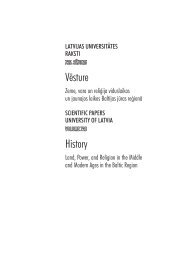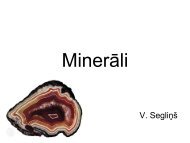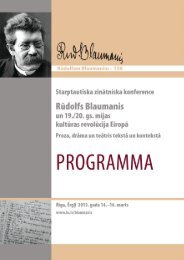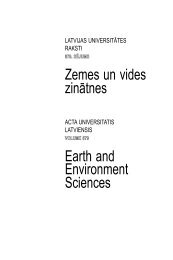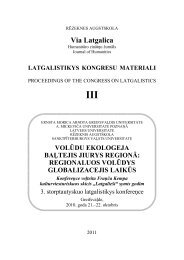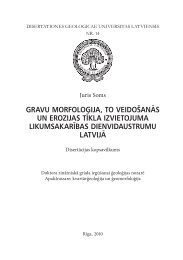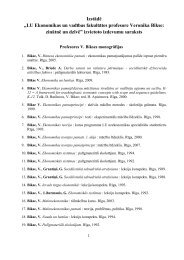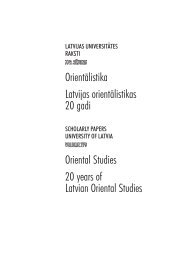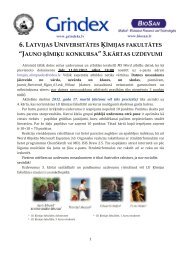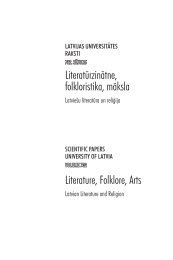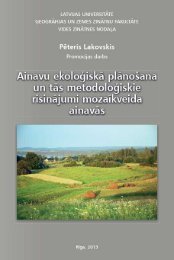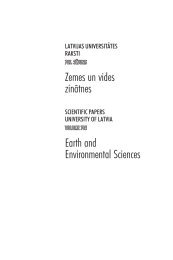- Page 4 and 5: UDK 82.0:821+398+7(082) Li 848 Galv
- Page 6 and 7: 6 LITERATÛRZINÂTNE, FOLKLORISTIKA
- Page 8 and 9: 8 LITERATÛRZINÂTNE, FOLKLORISTIKA
- Page 10 and 11: 10 LITERATÛRZINÂTNE, FOLKLORISTIK
- Page 12 and 13: 12 LITERATÛRZINÂTNE, FOLKLORISTIK
- Page 14 and 15: 14 LITERATÛRZINÂTNE, FOLKLORISTIK
- Page 16 and 17: 16 LITERATÛRZINÂTNE, FOLKLORISTIK
- Page 18 and 19: 18 LITERATÛRZINÂTNE, FOLKLORISTIK
- Page 20 and 21: 20 LITERATÛRZINÂTNE, FOLKLORISTIK
- Page 22 and 23: 22 LITERATÛRZINÂTNE, FOLKLORISTIK
- Page 24 and 25: LATVIJAS UNIVERSITÂTES RAKSTI. 200
- Page 26 and 27: 26 LITERATÛRZINÂTNE, FOLKLORISTIK
- Page 28 and 29: 28 LITERATÛRZINÂTNE, FOLKLORISTIK
- Page 30 and 31: 30 LITERATÛRZINÂTNE, FOLKLORISTIK
- Page 34 and 35: 34 LITERATÛRZINÂTNE, FOLKLORISTIK
- Page 36 and 37: LATVIJAS UNIVERSITÂTES RAKSTI. 200
- Page 38 and 39: 38 LITERATÛRZINÂTNE, FOLKLORISTIK
- Page 40 and 41: 40 LITERATÛRZINÂTNE, FOLKLORISTIK
- Page 42 and 43: 42 LITERATÛRZINÂTNE, FOLKLORISTIK
- Page 44 and 45: 44 LITERATÛRZINÂTNE, FOLKLORISTIK
- Page 46 and 47: 46 LITERATÛRZINÂTNE, FOLKLORISTIK
- Page 48 and 49: 48 LITERATÛRZINÂTNE, FOLKLORISTIK
- Page 50 and 51: LATVIJAS UNIVERSITÂTES RAKSTI. 200
- Page 52 and 53: 52 LITERATÛRZINÂTNE, FOLKLORISTIK
- Page 54 and 55: 54 LITERATÛRZINÂTNE, FOLKLORISTIK
- Page 56 and 57: 56 LITERATÛRZINÂTNE, FOLKLORISTIK
- Page 58 and 59: 58 LITERATÛRZINÂTNE, FOLKLORISTIK
- Page 60 and 61: 60 LITERATÛRZINÂTNE, FOLKLORISTIK
- Page 62 and 63: 62 LITERATÛRZINÂTNE, FOLKLORISTIK
- Page 64 and 65: 64 LITERATÛRZINÂTNE, FOLKLORISTIK
- Page 66 and 67: 66 LITERATÛRZINÂTNE, FOLKLORISTIK
- Page 68 and 69: LATVIJAS UNIVERSITÂTES RAKSTI. 200
- Page 70 and 71: 70 LITERATÛRZINÂTNE, FOLKLORISTIK
- Page 72 and 73: 72 LITERATÛRZINÂTNE, FOLKLORISTIK
- Page 74 and 75: 74 LITERATÛRZINÂTNE, FOLKLORISTIK
- Page 76 and 77: 76 LITERATÛRZINÂTNE, FOLKLORISTIK
- Page 78 and 79: 78 LITERATÛRZINÂTNE, FOLKLORISTIK
- Page 80 and 81: 80 LITERATÛRZINÂTNE, FOLKLORISTIK
- Page 82 and 83:
82 LITERATÛRZINÂTNE, FOLKLORISTIK
- Page 84 and 85:
LATVIJAS UNIVERSITÂTES RAKSTI. 200
- Page 86 and 87:
86 LITERATÛRZINÂTNE, FOLKLORISTIK
- Page 88 and 89:
88 LITERATÛRZINÂTNE, FOLKLORISTIK
- Page 90 and 91:
90 LITERATÛRZINÂTNE, FOLKLORISTIK
- Page 92 and 93:
92 LITERATÛRZINÂTNE, FOLKLORISTIK
- Page 94 and 95:
94 LITERATÛRZINÂTNE, FOLKLORISTIK
- Page 96 and 97:
96 LITERATÛRZINÂTNE, FOLKLORISTIK
- Page 98 and 99:
LATVIJAS UNIVERSITÂTES RAKSTI. 200
- Page 100 and 101:
100 LITERATÛRZINÂTNE, FOLKLORISTI
- Page 102 and 103:
102 LITERATÛRZINÂTNE, FOLKLORISTI
- Page 104 and 105:
104 LITERATÛRZINÂTNE, FOLKLORISTI
- Page 106 and 107:
LATVIJAS UNIVERSITÂTES RAKSTI. 200
- Page 108 and 109:
108 LITERATÛRZINÂTNE, FOLKLORISTI
- Page 110 and 111:
110 LITERATÛRZINÂTNE, FOLKLORISTI
- Page 112 and 113:
112 LITERATÛRZINÂTNE, FOLKLORISTI
- Page 114 and 115:
114 LITERATÛRZINÂTNE, FOLKLORISTI
- Page 116 and 117:
116 LITERATÛRZINÂTNE, FOLKLORISTI
- Page 118 and 119:
118 LITERATÛRZINÂTNE, FOLKLORISTI
- Page 120 and 121:
120 LITERATÛRZINÂTNE, FOLKLORISTI
- Page 122 and 123:
LATVIJAS UNIVERSITÂTES RAKSTI. 200
- Page 124 and 125:
124 LITERATÛRZINÂTNE, FOLKLORISTI
- Page 126 and 127:
126 LITERATÛRZINÂTNE, FOLKLORISTI
- Page 128 and 129:
128 LITERATÛRZINÂTNE, FOLKLORISTI
- Page 130 and 131:
130 LITERATÛRZINÂTNE, FOLKLORISTI
- Page 132 and 133:
132 LITERATÛRZINÂTNE, FOLKLORISTI
- Page 134 and 135:
134 LITERATÛRZINÂTNE, FOLKLORISTI
- Page 136 and 137:
136 LITERATÛRZINÂTNE, FOLKLORISTI
- Page 138 and 139:
138 LITERATÛRZINÂTNE, FOLKLORISTI
- Page 140 and 141:
140 LITERATÛRZINÂTNE, FOLKLORISTI
- Page 142 and 143:
142 LITERATÛRZINÂTNE, FOLKLORISTI
- Page 144 and 145:
144 LITERATÛRZINÂTNE, FOLKLORISTI
- Page 146 and 147:
146 LITERATÛRZINÂTNE, FOLKLORISTI
- Page 148 and 149:
148 LITERATÛRZINÂTNE, FOLKLORISTI
- Page 150 and 151:
150 LITERATÛRZINÂTNE, FOLKLORISTI
- Page 152 and 153:
152 LITERATÛRZINÂTNE, FOLKLORISTI
- Page 154 and 155:
154 LITERATÛRZINÂTNE, FOLKLORISTI
- Page 156 and 157:
156 LITERATÛRZINÂTNE, FOLKLORISTI
- Page 158 and 159:
LATVIJAS UNIVERSITÂTES RAKSTI. 200
- Page 160 and 161:
160 LITERATÛRZINÂTNE, FOLKLORISTI
- Page 162 and 163:
162 LITERATÛRZINÂTNE, FOLKLORISTI
- Page 164 and 165:
LATVIJAS UNIVERSITÂTES RAKSTI. 200
- Page 166 and 167:
166 LITERATÛRZINÂTNE, FOLKLORISTI
- Page 168 and 169:
168 LITERATÛRZINÂTNE, FOLKLORISTI
- Page 170 and 171:
170 LITERATÛRZINÂTNE, FOLKLORISTI
- Page 172 and 173:
LATVIJAS UNIVERSITÂTES RAKSTI. 200
- Page 174 and 175:
174 LITERATÛRZINÂTNE, FOLKLORISTI
- Page 176 and 177:
176 LITERATÛRZINÂTNE, FOLKLORISTI
- Page 178 and 179:
178 LITERATÛRZINÂTNE, FOLKLORISTI
- Page 180 and 181:
LATVIJAS UNIVERSITÂTES RAKSTI. 200
- Page 182 and 183:
182 LITERATÛRZINÂTNE, FOLKLORISTI
- Page 184 and 185:
184 LITERATÛRZINÂTNE, FOLKLORISTI
- Page 186 and 187:
186 LITERATÛRZINÂTNE, FOLKLORISTI
- Page 188 and 189:
LATVIJAS UNIVERSITÂTES RAKSTI. 200
- Page 190 and 191:
190 LITERATÛRZINÂTNE, FOLKLORISTI
- Page 192 and 193:
192 LITERATÛRZINÂTNE, FOLKLORISTI
- Page 194 and 195:
LATVIJAS UNIVERSITÂTES RAKSTI. 200
- Page 196 and 197:
196 LITERATÛRZINÂTNE, FOLKLORISTI
- Page 198 and 199:
198 LITERATÛRZINÂTNE, FOLKLORISTI
- Page 200 and 201:
200 LITERATÛRZINÂTNE, FOLKLORISTI
- Page 202 and 203:
202 LITERATÛRZINÂTNE, FOLKLORISTI
- Page 204 and 205:
204 LITERATÛRZINÂTNE, FOLKLORISTI
- Page 206 and 207:
206 LITERATÛRZINÂTNE, FOLKLORISTI
- Page 208 and 209:
208 LITERATÛRZINÂTNE, FOLKLORISTI
- Page 210 and 211:
210 LITERATÛRZINÂTNE, FOLKLORISTI
- Page 212 and 213:
212 LITERATÛRZINÂTNE, FOLKLORISTI
- Page 214 and 215:
214 LITERATÛRZINÂTNE, FOLKLORISTI
- Page 216 and 217:
216 LITERATÛRZINÂTNE, FOLKLORISTI
- Page 218 and 219:
218 LITERATÛRZINÂTNE, FOLKLORISTI
- Page 220 and 221:
220 LITERATÛRZINÂTNE, FOLKLORISTI
- Page 222 and 223:
LATVIJAS UNIVERSITÂTES RAKSTI. 200
- Page 224 and 225:
224 LITERATÛRZINÂTNE, FOLKLORISTI
- Page 226 and 227:
226 LITERATÛRZINÂTNE, FOLKLORISTI
- Page 228 and 229:
228 LITERATÛRZINÂTNE, FOLKLORISTI
- Page 230 and 231:
LATVIJAS UNIVERSITÂTES RAKSTI. 200
- Page 232 and 233:
232 LITERATÛRZINÂTNE, FOLKLORISTI
- Page 234 and 235:
234 LITERATÛRZINÂTNE, FOLKLORISTI
- Page 236 and 237:
236 LITERATÛRZINÂTNE, FOLKLORISTI
- Page 238 and 239:
238 LITERATÛRZINÂTNE, FOLKLORISTI
- Page 240 and 241:
240 LITERATÛRZINÂTNE, FOLKLORISTI
- Page 242 and 243:
242 LITERATÛRZINÂTNE, FOLKLORISTI
- Page 244 and 245:
244 LITERATÛRZINÂTNE, FOLKLORISTI
- Page 246 and 247:
246 LITERATÛRZINÂTNE, FOLKLORISTI
- Page 248 and 249:
248 LITERATÛRZINÂTNE, FOLKLORISTI
- Page 250 and 251:
250 LITERATÛRZINÂTNE, FOLKLORISTI
- Page 252 and 253:
252 LITERATÛRZINÂTNE, FOLKLORISTI
- Page 254 and 255:
LATVIJAS UNIVERSITÂTES RAKSTI. 200
- Page 256 and 257:
256 LITERATÛRZINÂTNE, FOLKLORISTI
- Page 258 and 259:
LATVIJAS UNIVERSITÂTES RAKSTI. 200
- Page 260 and 261:
260 LITERATÛRZINÂTNE, FOLKLORISTI
- Page 262 and 263:
262 LITERATÛRZINÂTNE, FOLKLORISTI
- Page 264 and 265:
264 LITERATÛRZINÂTNE, FOLKLORISTI
- Page 266 and 267:
266 LITERATÛRZINÂTNE, FOLKLORISTI
- Page 268 and 269:
268 LITERATÛRZINÂTNE, FOLKLORISTI
- Page 270 and 271:
270 LITERATÛRZINÂTNE, FOLKLORISTI
- Page 272 and 273:
272 LITERATÛRZINÂTNE, FOLKLORISTI
- Page 274 and 275:
274 LITERATÛRZINÂTNE, FOLKLORISTI
- Page 276 and 277:
276 LITERATÛRZINÂTNE, FOLKLORISTI
- Page 278:
LU Akadçmiskais apgâds Baznîcas



